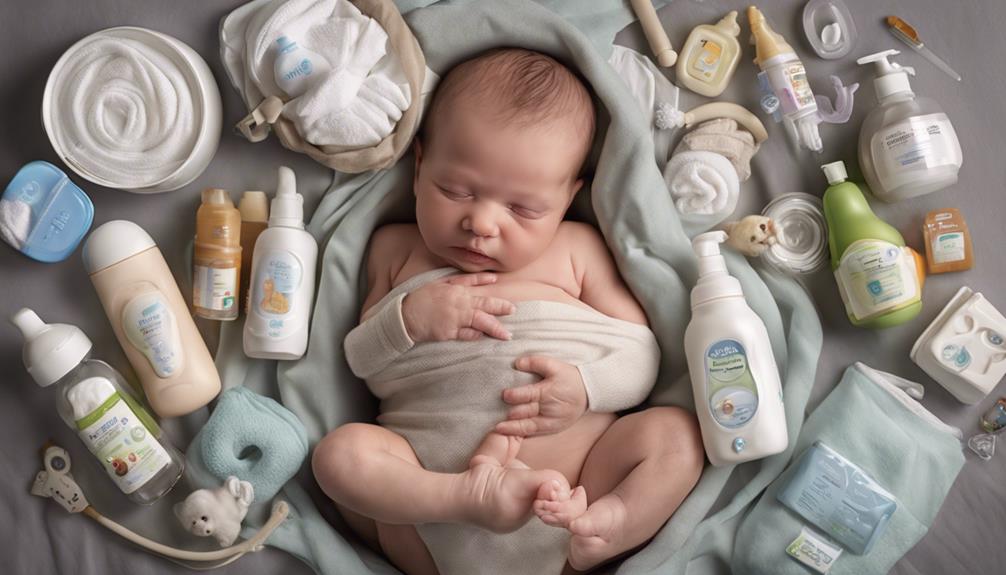When it comes to managing newborn hiccups, wading through the sea of solutions can feel like searching for a needle in a haystack. But fear not, as the NHS Guide is here to guide you towards calm waters.
With gentle techniques and practical advice, you can help ease your little one's discomfort and find relief. So, are you ready to uncover the secrets to soothing those pesky hiccups and keeping your baby content?
Key Takeaways
- Feed smaller, more frequent meals to reduce hiccups.
- Keep baby upright after feeding to aid digestion.
- Gently pat or rub the back to alleviate hiccups.
- Seek medical help for severe symptoms or prolonged hiccups.
What Are Newborn Hiccups?
If your newborn is experiencing hiccups, understanding what causes these sudden contractions is important. Hiccups in babies are often a result of the diaphragm muscle contracting and the vocal cords closing quickly. During feeding or crying, excess air can get trapped in the baby's tummy, leading to hiccups. While hiccups are common and usually harmless, they can sometimes be a sign of acid reflux in newborns. Acid reflux occurs when stomach acid flows back into the esophagus, causing discomfort for your baby. Watching for signs of reflux, such as frequent spitting up, irritability during or after feeding, and arching of the back, is crucial.
To help stop and prevent hiccups in your newborn, make sure they're burped frequently during feedings to release any trapped air. Keeping your baby upright for about 20-30 minutes after feeding can also help reduce reflux symptoms. If you suspect acid reflux is causing your baby's hiccups, consult with your pediatrician for further evaluation and guidance.
Causes of Newborn Hiccups
Newborn hiccups typically occur due to the involuntary contractions of the diaphragm muscle and the rapid closure of the vocal cords. When babies swallow excess air during feeding or crying, it can lead to those adorable yet sometimes concerning hiccups. These little hiccups may also be a sign of acid reflux, causing discomfort from stomach acid.
Due to their immature digestive systems, babies are more prone to experiencing hiccups. Additionally, sudden changes in temperature can trigger these hiccup sounds, making them a common occurrence in newborns. The quick closure of the vocal cords contributes to the distinctive sound of hiccups in babies.
Understanding these causes can help you navigate and address your baby's hiccups with care and reassurance.
NHS Recommended Solutions for Hiccups

To address and alleviate newborn hiccups, the NHS recommends practical solutions that focus on feeding habits and post-feeding care. Here are a few tips to help you manage your baby's hiccups effectively:
- Feeding Smaller, More Frequent Meals: Opt for smaller, more frequent feedings to prevent hiccups in your newborn. This can help in reducing the chances of hiccups occurring after meals.
- Keeping Baby Upright: After feeding, keep your baby upright for a little while. This position can aid in digestion, reduce reflux, and potentially lessen the frequency of hiccups.
- Rubbing or Patting Back Gently: Gently rubbing or patting your baby's back after feeding can help encourage burping, which may prevent reflux and alleviate hiccups.
When to Seek Medical Help

At the first sign of prolonged hiccups or concerning symptoms in your newborn, seeking prompt medical attention is crucial for proper evaluation and care. If your baby's hiccups persist for over an hour despite trying soothing techniques, or if they are accompanied by symptoms such as vomiting, high fever, or breathing difficulties, it is imperative to seek medical help immediately. Babies with gastroesophageal reflux disease may experience severe hiccups that require urgent evaluation by healthcare professionals. Signs of distress in newborns, especially if accompanied by prolonged hiccups, should prompt a visit to a healthcare provider for assessment.
| Signs | When to Seek Help | Additional Information |
|---|---|---|
| Prolonged Hiccups | Lasting over an hour despite trying soothing techniques | Could indicate an underlying issue |
| High Fever | Fever over 100.4°F (38°C) or higher | May suggest an infection or other serious condition |
| Breathing Difficulties | Labored breathing, wheezing, or other respiratory issues | Could signal a more significant problem |
Prevention Tips for Newborn Hiccups

If your baby experiences frequent hiccups, implementing simple preventive measures can help minimize their occurrence and discomfort.
Here are some tips to help prevent hiccups in newborns:
- Burp Regularly: Burping your baby after every 2-3 ounces of feeding can prevent hiccups by releasing trapped air.
- Breastfeeding Techniques: If you breastfeed, remember to burp your baby when switching between breasts to reduce the intake of excess air.
- Feeding Habits: Opt for smaller, more frequent meals to prevent your baby from swallowing excessive air, which can lead to hiccups.
Frequently Asked Questions
What Can I Give My Newborn to Stop Hiccups?
To stop newborn hiccups, try breastfeeding or offering a pacifier to relax the diaphragm. Change feeding positions and guarantee proper burping. Create a calm feeding environment and avoid overfeeding. Consult a healthcare provider for personalized advice on managing hiccups.
How Do You Get Rid of Hiccups in a Newborn Nhs?
To get rid of hiccups in a newborn, try burping after feeds, keeping upright, and offering smaller meals. Changing feeding positions and gentle back rubs can help. NHS recommends these simple steps for soothing those tiny hiccups.
Is It OK to Lay My Newborn Down With Hiccups?
It's absolutely okay to lay your newborn down with hiccups. Hiccups are common and harmless for infants. Your baby can sleep soundly, and the hiccups usually go away on their own. Comfort them gently if needed.
Should I Stop Feeding Newborn With Hiccups?
When your newborn has hiccups during feeding, pausing briefly to burp them can ease discomfort and prevent worsening. Adjust positions, keep them calm, and resume feeding gently to help them feed comfortably.
Conclusion
To sum up, remember to practice patience and persistence when pacifying your precious newborn's persistent hiccups.
Stay soothingly calm, seeking medical support if hiccups persist.
With gentle gestures and proper feeding, you can help your little one find relief from those tiny troublesome hiccups.
Keep cuddling, caring, and comforting your cherished child as you conquer those pesky newborn hiccups together.









